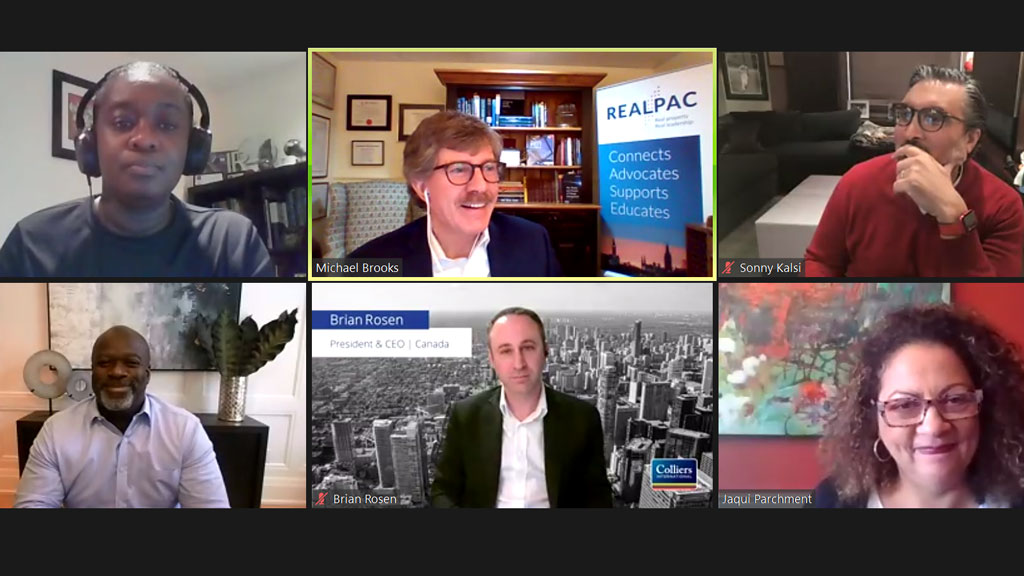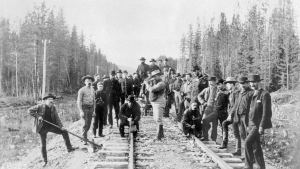A panel comprised of leaders who champion equity, diversity and inclusion in the commercial real estate (CRE) industry discussed the steps their firms are taking to combat racism.
“One of the things that will affect whether your employees choose to stay with you, are able to thrive with you, is whether or not they fundamentally feel that they can bring their whole selves to work and they can truly be who they are,” explained Jaqui Parchment, CEO of Mercer Canada, during the recent webinar.
“When I entered the workforce as a co-op student working my way through university I was a new immigrant. I moved from Jamaica and I walked into an office that was really foreign to me.
“There were structures in place that, without realizing it, were really exclusionary.”
The best way to understand, she said, is to ask your colleagues and really listen to what they have to say.
“I would ask that you listen and not have the conversation be about your own feelings…or turning the conversation around to make yourself comfortable,” said Parchment. “If we’re going to move forward with the belonging agenda we have to get used to being uncomfortable.”
The webinar was the second part of the multi-series program on Racism and Exclusion in the Workplace, presented by REALPAC, the Urban Land Institute and partners and sponsored by KingSett Capital. The event was called The BlackNorth Initiative and the Black Opportunity Fund: How the CRE industry can get involved.
The ‘cappuccino effect’
Parchment talked about what she calls the “cappuccino effect,” a metaphor for the workplace with black on the bottom and white on the top.
“We hear from Black people that there is this effect that there are not people in positions of leadership and influence who look like us and that is a really big problem,” she noted. “How do you solve for that? The conversation around belonging is an important part but I also think it’s incredibly important to start unpacking what is built into the system that prevents the advancement of people of colour and actually women. Our systems were built for white men, so the way you advance through those systems is reflective of what works for white men.”
Stepping back and unpacking all the company’s HR practices is a good first step.
“How do you think about promotions? Hiring? How you make those judgements,” asked Parchment. “Does that sound complex and difficult? One hundred per cent, but if we want to move to a Canada that utilizes the talent of all of our people instead of a small minority, we have to do that.”
The Black Opportunity Fund and the BlackNorth Initiative
Dennis Mitchell, CEO and CIO of Starlight Capital, discussed the Black Opportunity Fund (BOF), a partnership between businesses, philanthropists, foundations and the Black community to combat the impact of anti-Black racism in Canada.
“Our goal is to raise a permanently endowed pool of capital to support the black community,” he said. “Given everything that happened this summer, it really created an environment where leaders came together and said it is time for us to give not just our money but our time, our expertise and our networks to support the larger Black community coast to coast. We’re here to listen to the Black community and advocate on their behalf.”
The BlackNorth Initiative, led by the Canadian Council of Business Leaders Against Anti-Black Systemic Racism, is on a mission to end anti-Black systemic racism by utilizing a business first mindset.
“We are asking CEOs across the country to sign a pledge and we ask them to commit to specific initiatives to fight racism,” said Isabelle Adjahi, a Quebec-based senior investor relations and communications executive who is part of the BlackNorth initiative. “If we want to implement a change that will be a long lasting, one we need to tackle the issues affecting Black people in their day to day lives.”
Take action, make changes
Sonny Kalsi, CEO of BentallGreenOak, said his firm is committing 66 per cent of all incoming hires will be minorities or women.
He said with both making up a large part of the population “it’s just simple math.”
“If we don’t set quantitative targets then it’s really hard to measure and it’s hard to hold ourselves accountable,” said Kalsi.
“The easiest part of this is the hiring part. I want our companies to represent the broader society in which we operate.”
Brian Rosen, president and CEO, Canada, for Colliers International, said it’s important to have different points of view within companies to push change.
“From a company perspective, I want different frames of reference, points of view, different ways of thinking and experience,” he said. “It’s important for our clients and for our communities and it’s important to help my business grow.”
Even more important is to make the changes, he added.
“We have to make some critical hires, change some policies.”
Because the industry is relationship driven, Mitchell said “there may come a point where when you are looking to bid on properties or rezone that seller or that municipality is going to say we’re only interested in accepting bids or awarding zoning to companies that look like the communities that they want to do work in.”
Training is also important, said Mitchell.
“People, especially white males, when you go through an unconscious bias training it opens your eyes,” he said. “A lot of people haven’t been through it. The more you can do that at an organization it will actually level set a lot of people’s perceptions on things.”
Follow the author on Twitter @DCN_Angela.








Recent Comments
comments for this post are closed